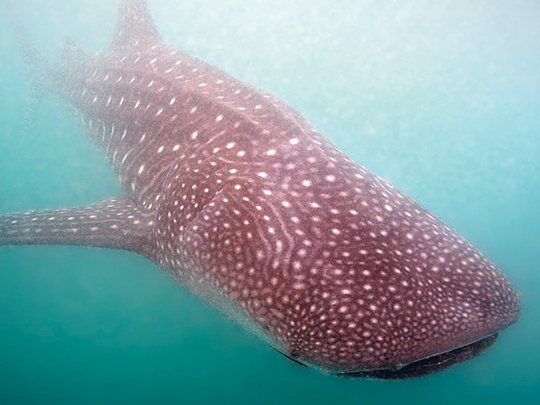
Abu Dhabi: A young member of the ocean's largest fish species made yet another special appearance in the capital, attracting admirers who wanted to swim beside it.
The whale shark — which is an endangered species — was spotted on Sunday by marine scientists at the Abu Dhabi Environment Agency inside Al Bateen harbour.
The five-metre whale shark had entered the harbour while roaming in the coastal waters for food, the environment agency said.
Abu Dhabi's coastal waters are known as a hosting habitat for the whale sharks because it is rich in the microscopic plants and animals — scientifically known as phytoplanktons and zooplanktons — that are the giant, harmless fish's main food source.
After sheltering in the harbour for three days, the shark swam away yesterday, the agency's biodiversity management sector director Thabit Al Abdul Salam said.
Al Abdul Salam's team has been monitoring the fish. "For the time being the whale shark has left the area," he said.
"But from past experience, we know, it is most likely to return and be here for some more time."
The last whale shark spotted here was 3.4m long, and it was near Emirates Palace last year, he said.
The agency had checked on the health of this most recent whale shark visitor in Abu Dhabi, he said.
"Usually there are two or three visits recorded every year but this time it is a bit early," he said. "Generally they are seen during autumn months."
Al Abdul Salam said although the fish knew its way in and out of the harbour, the high number of boats in the harbour meant it could become stranded. "In such cases we guide the fish to the open sea," he said.
Al Abdul Salam urged residents next time they saw a whale shark, to not disturb it. The fish were highly sensitive, especially to noise. "People love it and they want to swim alongside it. But we advise them not to."
Whale sharks in the area were likely to be juveniles as the Arabian Gulf was their nursery ground.
King of the ocean
- The whale shark is the largest fish in the sea, reaching lengths of more than 12 metres and weights of more than 20 tonnes
- This fish with distinctive markings is the only member of its genus Rhincodon and its family, Rhincodontidae, that can live up to 70 years.
- Preferring warm waters, whale sharks populate all tropical seas. Although massive, they are docile fish and sometimes allow swimmers to hitch a ride.
- The whale shark is a filter feeder which consumes plankton which they scoop up in their gaping mouths while swimming close to the water's surface.
- They are currently listed as a vulnerable species. However, they continue to be hunted in parts of Asia.
- As a filter feeder it has a capacious mouth which can be up to 1.5m wide and can contain between 300 and 350 rows of tiny teeth. The body is mostly grey with a white belly; three prominent ridges run along each side of the animal and the skin is marked with a "checkerboard" of pale yellow spots and stripes. These spots are unique to individuals and useful for counting populations. Its skin can be 10cm thick.
- This species does not pose significant danger to humans.
- The female shark can carry more than 300 pups. The eggs remain in the body and the females give birth to live young which are 40 to 60cm long. It is believed that they reach maturity at 30 and live for 70 to 100 years.












